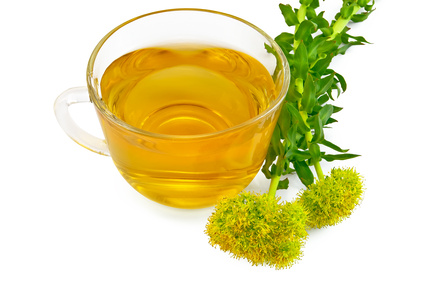Rhodiola rosea, is a perennial plant which grows on the sandy, rocky, cold, and dry soil of Siberian mountain slopes. While research has been conducted on the plant in some areas of the world, only recently has the West begun to investigate its health benefits. Rhodiola is a popular plant in traditional medical systems in Eastern Europe and Asia. Since 1961, more than 180 studies have been published in Slavic and Scandinavian journals.
Rhodiola Benefits
Rhodiola rosea contains rosavin, salidrosides, rosarin and tyrosol. There have been many studies conducted on rhodiola and many have published positive results. Studies in cell cultures, animals, and humans have revealed antifatigue, anti-stress, anticancer, antioxidant, immune enhancing and sexual stimulating effects.
Adaptogenic
Rhodiola is an adaptogenic herb, this means that it works by having a positive impact on the balance of the whole body, not just treating one condition. An adaptogen is a physiological agent that naturally increases the body’s resistance to physical and emotional stress. Numerous double-blind, placebo-controlled clinical trials show that rhodiola can increase general wellbeing, reduce mental fatigue, and improve learning and memory.
Energy
Rhodiola extract has been shown to increase physical and mental performance by more efficiently mobilizing and sustaining muscular energy reserves. Rhodiola extract increases the level of enzymes, RNA, and proteins important to muscle recovery after exhaustive exercise. Rhodiola does help improve mental and physical performance, according to a study published in 2010 in Phytomedicine. In one study of 112 athletes, researchers discovered that 89% of those supplemented with rhodiola showed rapid improvement in both speed and strength during track and field, swimming, speed skating and ski racing.
Depression
 Rhodiola rosea has been clinically shown to stimulate serotonin, dopamine and norepinephrine activity and may help to support a healthy neurotransmitter balance. A study published in 2007 in the Nordic Journal of Psychiatry showed that patients with mild to-moderate depression who took a rhodiola extract reported fewer symptoms than those who took a placebo. The root extracts of rhodiola were shown to have strong anti-depressant effects by inhibiting monoamine oxidases A and B. According to a study published in the 2009 edition of The Journal of Ethnopharmacology, rhodiola contains potent antidepressant properties that may improve mood and function of the nervous system. Rhodiola has been found to stimulate the neurotransmitters responsible for creating feelings of well-being as well as offering significant relief for low energy conditions like asthenia. A 100-300 mg dose is recommended to promote healthy cognitive functions such as focus, attention, concentration, memory and mental sharpness.
Rhodiola rosea has been clinically shown to stimulate serotonin, dopamine and norepinephrine activity and may help to support a healthy neurotransmitter balance. A study published in 2007 in the Nordic Journal of Psychiatry showed that patients with mild to-moderate depression who took a rhodiola extract reported fewer symptoms than those who took a placebo. The root extracts of rhodiola were shown to have strong anti-depressant effects by inhibiting monoamine oxidases A and B. According to a study published in the 2009 edition of The Journal of Ethnopharmacology, rhodiola contains potent antidepressant properties that may improve mood and function of the nervous system. Rhodiola has been found to stimulate the neurotransmitters responsible for creating feelings of well-being as well as offering significant relief for low energy conditions like asthenia. A 100-300 mg dose is recommended to promote healthy cognitive functions such as focus, attention, concentration, memory and mental sharpness.
Cortisol
Rhodiola modulates cortisol production during times of physical or emotional duress. Although an important hormone, the excessive release of cortisol that accompanies stressful situations can negatively impact on the metabolism. When cortisol is produced at an elevated amount and stays in our system for a prolonged period of time, it can do more damage than good. Rhodiola increases immune response while blocking the immune lowering effects of cortisol.
Immune Booster
Rhodiola rosea, stimulates appropriate immune responses. Has been found in studies to help to increase the activity of natural killer cells. The compounds in rhodiola attacks the virus at a cellular level by it’s immune stimulating action. It also improves T-cell immunity and increases the bodies resistance to toxins accumulated during infection. Stress suppresses immunity and destroys resistance to various forms of virus or bacterial attack. Also, by making us less susceptible to stress, rhodiola helps our immunity to disease indirectly.
Cancer
Administration of rhodiola extract appears to have potential as an anticancer agent. It helps to inhibit tumor growth on its own, and is also anti-mutagenic, substantially reducing the development of chromosomal aberrations. Study have shown that rhodiola reduced the cell mutations associated with cancer as well as help the body’s ability to repair DNA mutations. A study in rats showed that rhodiola decreased tumor growth by 39% and inhibited metastases by 50%. A 2006 study published in the Journal of Ethnopharmacology showed that rhodiola inhibited the cell division of certain cancer cells and effectively reduced their ability to survive. Another study published in April 2011 concerning treatments for bladder cancer concluded that rhodiola rosea and one of its bioactive components, salidroside showed positive effects on inhibiting the growth of bladder cancer cells.
Rhodiola Dosage
The usual dose of rhodiola is 200 to 600 mg daily (2-3% rosavins and 0.8-1% salidroside). The most recent comprehensive clinical trial, conducted in 2007, suggested effective daily dosage of rhodiola rosea was in the 340 to 680 milligram range. In tincture form, to 40 drops are used, two to three times a day.
Rhodiola Side Effects
Generally, rhodiola rosea side effects are rare and very few. Rhodiola can cause restlessness, irritability and insomnia if taken in high doses. It is not recommended for people who are bipolar, manic, paranoid, or during pregnancy or lactation. The activating and antidepressant effects of rhodiola can trigger manic reaction in those with bipolar disorder.
Leave a Reply